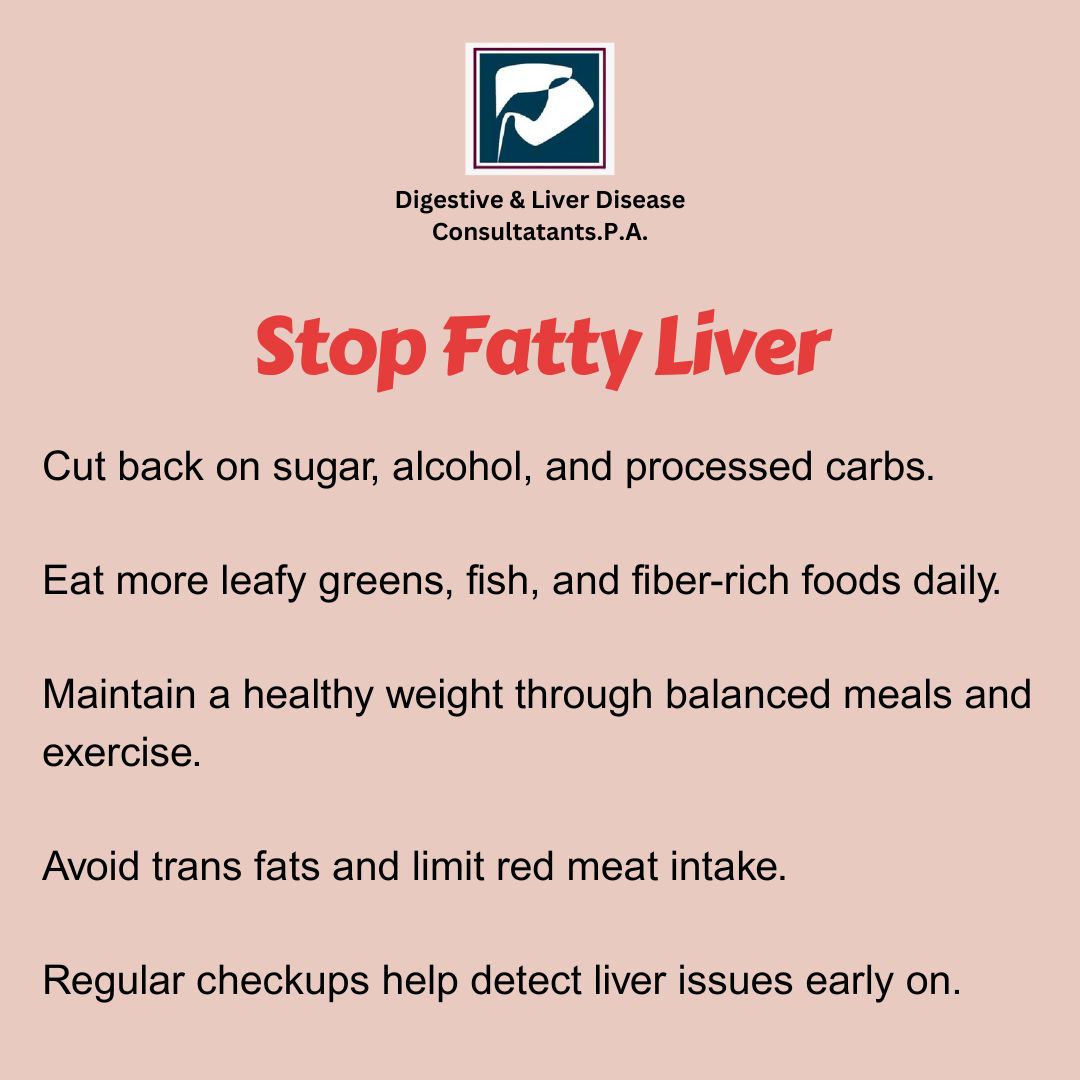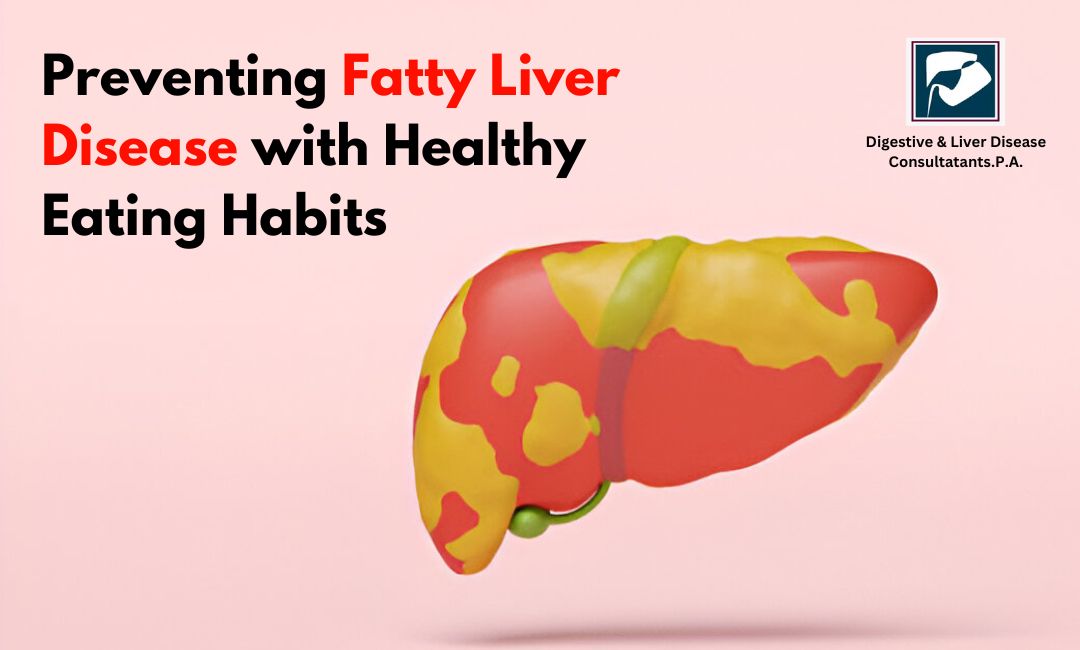Fatty liver disease is a growing health concern worldwide. It happens when excess fat builds up in the liver, causing inflammation and damage over time. If left unchecked, it can lead to serious problems like liver fibrosis, cirrhosis, or even liver failure. The good news? Fatty liver disease is largely preventable — especially with the right eating habits.
At Digestive & Liver Disease Consultants, P.A., we help patients understand how lifestyle changes, especially diet, can protect liver health and prevent disease progression. In this blog, we will explain what fatty liver disease is, why diet matters, and practical tips to keep your liver healthy through nutrition.
What Is Fatty Liver Disease?
Fatty liver disease, medically known as hepatic steatosis, means fat accumulates in liver cells. There are two main types:
- Non-Alcoholic Fatty Liver Disease (NAFLD): Fat buildup not caused by alcohol, often linked to obesity, diabetes, and poor diet.
- Alcoholic Fatty Liver Disease: Caused by excessive alcohol consumption.
NAFLD is the most common type and is increasing due to poor eating habits and sedentary lifestyles. Early stages may have no symptoms, but as fat builds up, it can cause liver inflammation, leading to more severe liver conditions.

Why Does Diet Matter?
Your liver plays a vital role in filtering toxins, storing energy, and processing nutrients. When too much fat accumulates, the liver can’t work properly. Diet directly affects how much fat is stored in the liver and influences liver inflammation.
Eating unhealthy foods—high in sugars, refined carbs, saturated and trans fats—can contribute to fat buildup. On the other hand, a balanced diet with nutrient-rich foods supports liver function and helps reduce fat in the liver.
Key Healthy Eating Habits to Prevent Fatty Liver Disease
1. Choose Whole, Unprocessed Foods
Eating fresh fruits, vegetables, whole grains, nuts, and seeds provides vitamins, minerals, and fiber your liver needs to function well. Fiber helps regulate blood sugar and cholesterol, both linked to fatty liver risk.
Focus on:
Leafy greens like spinach, kale, and collards
- Berries such as blueberries and strawberries
- Whole grains like oats, brown rice, and quinoa
- Nuts and seeds, especially walnuts and flaxseeds
2. Limit Added Sugars and Refined Carbs
Foods high in added sugars and refined carbs—such as white bread, pastries, soda, and candy—cause rapid blood sugar spikes. These can lead to insulin resistance, a key factor in fatty liver disease.
Reduce your intake of:
- Sugary drinks (soda, sweetened juices)
- White flour products (white bread, pasta)
- Desserts high in sugar
Instead, choose complex carbs like whole grains that digest slowly and keep blood sugar steady.
3. Cut Back on Saturated and Trans Fats
Saturated fats found in red meat, butter, and full-fat dairy can increase liver fat. Trans fats, often in fried and processed foods, are even more harmful. These fats promote inflammation and worsen fatty liver.
Healthy fat choices include:
- Olive oil
- Avocados
- Fatty fish like salmon and mackerel
- Nuts and seeds
4. Maintain a Healthy Weight
Obesity is one of the main risk factors for fatty liver disease. Losing even a small amount of weight (5-10% of your body weight) can significantly reduce liver fat and improve liver health.
Healthy eating combined with regular physical activity is the best approach to maintain a healthy weight.
5. Stay Hydrated
Drinking enough water supports digestion and liver function. Water helps flush out toxins and supports metabolism. Aim for at least 8 glasses of water a day, and limit sugary or alcoholic beverages.
Foods to Include for Liver Health
- Coffee: Studies show moderate coffee intake may protect the liver by reducing inflammation and fat buildup.
- Green Tea: Rich in antioxidants, green tea supports liver health.
- Garlic: Contains compounds that help reduce body fat and improve liver function.
- Turmeric: Its anti-inflammatory properties may help protect the liver from damage.
Foods to Avoid
- Alcohol: Excessive alcohol damages liver cells and worsens fatty liver.
- Processed Foods: High in unhealthy fats, salt, and sugar.
- Sugary Snacks and Beverages: Contribute to fat buildup and insulin resistance.
Lifestyle Tips Beyond Diet
- Exercise regularly: Aim for at least 30 minutes of moderate exercise most days of the week.
- Avoid smoking: Smoking worsens liver damage.
- Manage stress: Chronic stress can impact digestion and liver health.
How Digestive & Liver Disease Consultants, P.A. Can Help
Digestive & Liver Disease Consultants, P.A. is committed to helping patients maintain and restore digestive and liver health. Our team of experts specializes in diagnosing and treating fatty liver disease and other liver conditions. We offer personalized treatment plans based on the latest research and your unique health needs.
If you are concerned about fatty liver disease or have symptoms such as fatigue, abdominal discomfort, or unexplained weight changes, our specialists are here to help. We use advanced diagnostic tools and provide expert guidance on nutrition and lifestyle to help you protect your liver and improve your overall health.
Conclusion
Preventing fatty liver disease starts with healthy eating habits and lifestyle choices. By focusing on whole foods, limiting sugars and unhealthy fats, maintaining a healthy weight, and staying hydrated, you can significantly reduce your risk of liver disease.
Having digestive or liver concerns? Schedule a consultation with Digestive & Liver Disease Consultants, P.A. Our expert team is here to support your journey to optimal liver health.






